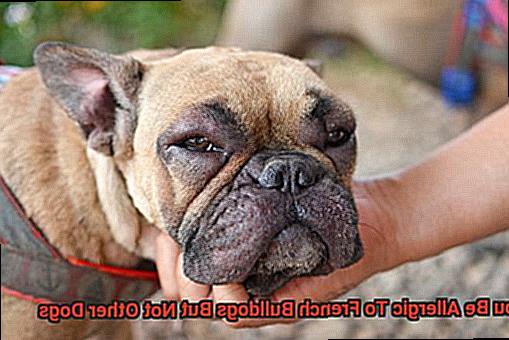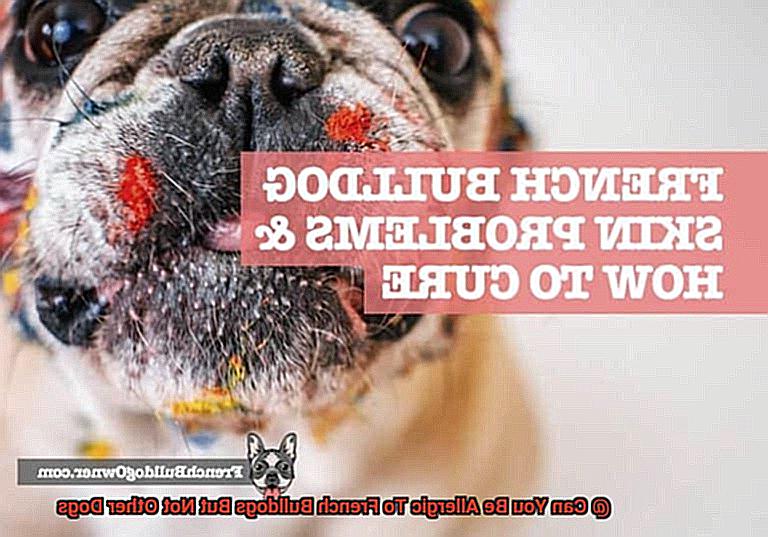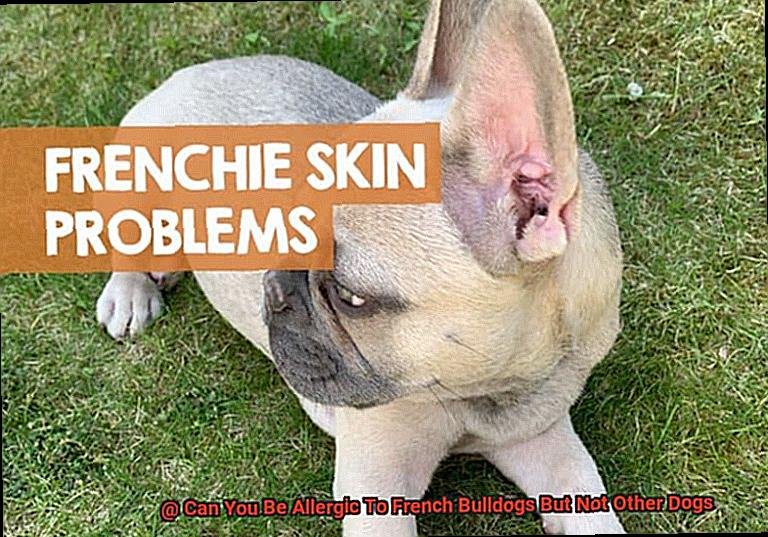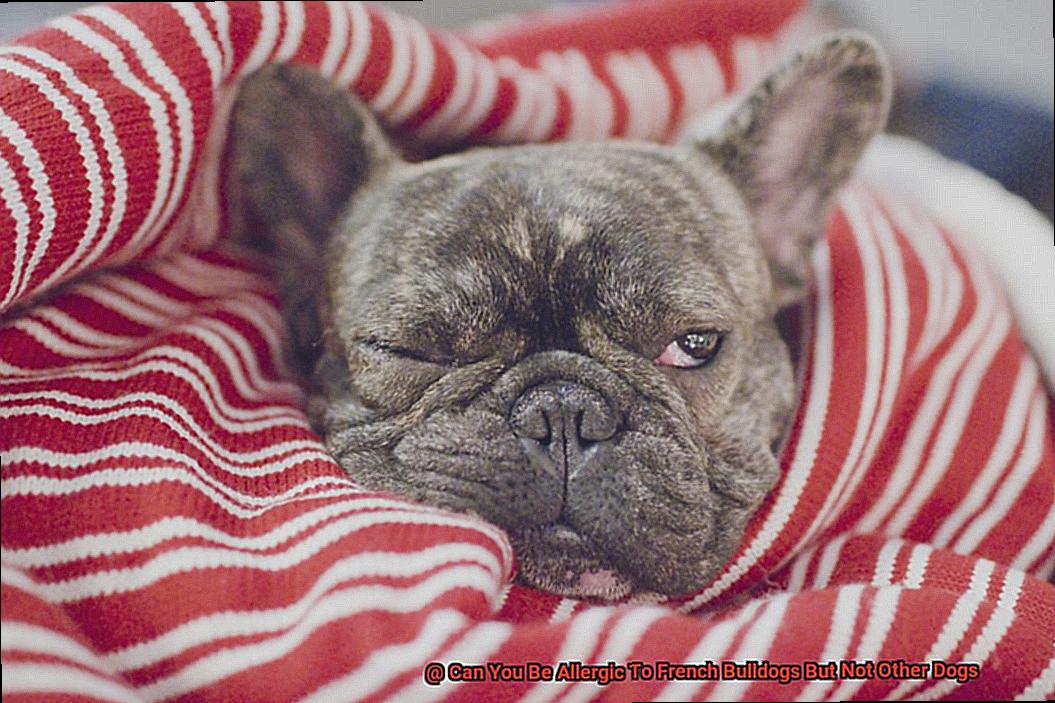Can You Be Allergic To French Bulldogs But Not Other Dogs?
We all know how heartbreaking it can be when allergies get in the way of our furry friendships. But here’s something intriguing: have you ever wondered why some people may be allergic to French Bulldogs while other dog breeds are totally fine? Well, in this article, we’re going to dig deep into the world of dog allergies and uncover the reasons behind this peculiar phenomenon.
Understanding Canine Allergies:
Contents
- 0.1 Understanding Canine Allergies:
- 0.2 Why French Bulldogs?
- 0.3 Hypoallergenic Misconception:
- 0.4 Other Factors to Consider:
- 1 Can You Be Allergic to French Bulldogs But Not Other Dogs?
- 2 The Difference in Allergen Levels Between Breeds
- 3 French Bulldogs and Dander Allergies
- 4 How to Test for Dog Allergens
- 5 Hypoallergenic Dog Breeds for Those with Sensitivities
- 6 Grooming and Bathing Tips to Reduce Allergen Exposure
- 7 Consulting a Healthcare Professional or an Allergist
- 8 Managing Your Dog Allergy Symptoms
- 9 Conclusion
So, let’s talk about doggy allergies for a sec. These pesky reactions usually happen because of proteins found in their urine, dander, or saliva. When these proteins come into contact with sensitive individuals’ noses or skin, bam. Allergic reaction time. Symptoms can range from sneezing fits to itchy rashes and even serious respiratory issues.
Why French Bulldogs?

Now, onto our adorable French Bulldog friends. It turns out that all dogs have these allergy-causing proteins to some extent. But here’s the twist: certain breeds produce fewer allergenic compounds than others. And guess what? Our lovable Frenchies happen to be one of those breeds. With their short and dense coats, they’ve been found to have lower levels of allergens compared to their furrier counterparts. However, keep in mind that everyone’s immune system is unique, so not everyone will tolerate French Bulldogs without experiencing an allergic reaction.
Hypoallergenic Misconception:

Hold up. Before we go any further, let’s debunk a common myth: no dog breed is truly hypoallergenic. Yeah, you heard me right. While some breeds like French Bulldogs might produce fewer allergens, it doesn’t mean you won’t still have a sniffle or two if you’re sensitive. So before adopting any puppers, make sure you spend some quality time with the breed to see if your allergies can handle it.
Other Factors to Consider:
Now, here’s a little something extra to think about. Besides allergenic properties, there are other factors that can contribute to allergic reactions. Take French Bulldogs, for example. They have those adorable facial wrinkles that can trap bacteria and allergens, potentially causing trouble for some sensitive souls. Proper grooming and hygiene routines are essential in managing and minimizing allergens, regardless of the breed.
Can You Be Allergic to French Bulldogs But Not Other Dogs?
Allergies can be a frustrating and uncomfortable experience, especially when they interfere with our love for our furry friends. Let’s explore this question and find out what the research says.
The Science Behind Dog Allergies
Allergies occur when our immune system reacts to certain substances as if they were harmful. In the case of dog allergies, proteins found in a dog’s skin cells, urine, and saliva are the main culprits. These proteins can become airborne and settle on surfaces, triggering allergic reactions in sensitive individuals.

French Bulldogs and Allergies
While it is possible to be allergic to French Bulldogs specifically, it is important to note that dog allergies are typically not breed-specific. In other words, if someone is allergic to French Bulldogs, they are likely to be allergic to other breeds as well. This is because the allergenic proteins found in dogs are generally similar across different breeds.
However, there is some good news for French Bulldog lovers who suffer from allergies. French Bulldogs may produce less dander compared to some other breeds due to their short coats and minimal shedding. Dander is a common allergen that can cause allergic reactions in sensitive individuals. So, if you are specifically allergic to dander, you may find that you have fewer or milder symptoms when exposed to French Bulldogs compared to other dog breeds.
It’s All About Individual Sensitivity
It’s worth noting that every individual has varying degrees of sensitivity to allergens. Some people may only experience mild symptoms when exposed to dogs, while others may have more severe reactions. So even if you are specifically allergic to French Bulldogs but not other dog breeds, your allergy symptoms may still vary depending on your level of sensitivity.
What Can You Do?
If you suspect that you are allergic to French Bulldogs or any other dog breed, it is essential to consult with an allergist for a proper diagnosis. Allergy testing can help identify specific allergens and determine if you are specifically allergic to French Bulldogs or other breeds.
If you do have an allergy to French Bulldogs but still want to have a pet dog, there are steps you can take to minimize allergen exposure. Regular grooming and bathing of your dog can help reduce the levels of allergens on their fur and skin. Keeping your living space clean and using air purifiers or filters can also help minimize airborne allergens. Additionally, considering hypoallergenic dog breeds, which produce fewer allergenic proteins or have hair instead of fur, may be an option to explore.
Remember, allergies can be managed with proper care and guidance from healthcare professionals. So, if you’re a French Bulldog lover with allergies, don’t lose hope – there are ways to enjoy the company of these adorable dogs while keeping your allergies under control.
The Difference in Allergen Levels Between Breeds
We know how much you adore these charming little pups, but we also understand that allergies can put a damper on your furry companionship. If you’re curious about the difference in allergen levels between dog breeds, particularly French Bulldogs, you’ve come to the right place. In this blog post, we’ll dive into the nitty-gritty of allergens and how they can affect your allergies when it comes to these adorable pups.
Shedding and Dander:
French Bulldogs are known for their short, fine coats, which means they don’t shed excessively. This is good news for individuals with allergies, as less shedding generally means lower levels of allergens in the environment. However, it’s important to remember that even dogs with minimal shedding can still trigger allergies in some people. So while French Bulldogs may be a better choice for allergy sufferers compared to breeds with longer and thicker coats, they aren’t completely hypoallergenic.
Grooming Habits:
Another factor that can influence allergen levels is a dog’s grooming habits. French Bulldogs are not known for excessive self-grooming behavior, which could potentially result in lower allergen levels. However, it’s still essential to maintain regular grooming practices to minimize allergen exposure further.
Environmental Factors:
Just like humans, dogs can pick up allergens from their surroundings. If your French Bulldog spends a lot of time outdoors or in dusty environments, they may carry additional allergens on their coat, increasing the risk of triggering allergic reactions. Regular baths and keeping your dog’s living space clean can help reduce these environmental allergens.
Individual Variations:

Allergies are unique to each individual, and what causes an allergic reaction in one person may not affect another to the same extent. Some people may be specifically allergic to proteins found in French Bulldogs but not other dog breeds. This could be due to variations in the specific proteins produced by different breeds or differences in immune responses. It’s important to spend time with a French Bulldog before bringing one into your home to assess your sensitivity to the breed.
Consult with Professionals:
If you suspect you have allergies to French Bulldogs or any other dog breed, it’s crucial to consult with a healthcare professional or an allergist. They can conduct specific tests to identify the allergens causing your reactions and provide appropriate guidance and treatment options.

French Bulldogs and Dander Allergies
Are you a French Bulldog owner or considering bringing one into your life? Do you or someone in your household suffer from dander allergies? It’s time to uncover the truth about French Bulldogs and allergies, so you can make an informed decision without sacrificing your health.
Hypoallergenic but Not Allergy-Free
Contrary to popular belief, French Bulldogs are not entirely allergy-free. While they are considered hypoallergenic, meaning they produce fewer allergens than other breeds, some individuals may still experience allergic reactions when exposed to these lovable pups.
Dander: The Culprit of Allergies
Dander, those tiny flakes of dead skin cells and hair, is the main source of allergens for people with dog allergies. French Bulldogs may have a shorter coat compared to other breeds, but they still produce dander that can trigger allergic reactions in sensitive individuals.
Individual Variations to Consider
Allergies are highly individualized, and each person may react differently to different breeds or even different individuals of the same breed. So, it’s possible for someone to be allergic to French Bulldogs but not experience allergies with other dog breeds.
Factors Affecting Allergen Levels
The level of allergens produced by a dog can vary depending on factors such as genetics, grooming habits, and overall health. Even within the same breed, some individual dogs may produce more allergens than others. So, if you’re allergic to one French Bulldog, don’t give up hope – another might be a better fit.
Beyond Dander: Other Allergens to Consider
Allergies to dogs are not always solely caused by dander. Saliva and urine can also contain allergens that trigger reactions in sensitive individuals. French Bulldogs may produce less dander than other breeds, but they still have saliva and urine that can cause symptoms for those specifically allergic to these allergens.
Managing Allergies and Enjoying Furry Companionship
If you suspect you have allergies to French Bulldogs or any other dog breed, it’s essential to undergo allergy testing. This will help determine the specific allergens that trigger your symptoms and provide guidance on managing your allergies effectively.
Luckily, there are measures you can take to minimize exposure to allergens if you’re allergic to French Bulldogs but still want a dog. Regular grooming, including bathing and brushing, can reduce dander on the coat. Using air purifiers and keeping a clean home also helps reduce allergen levels in the environment.
However, it’s crucial to consult with a healthcare professional or allergist for personalized recommendations and treatment options. They can guide you on managing allergies to French Bulldogs or any other dog breed, so you can enjoy the company of your furry friend without constant sneezing and itching.
How to Test for Dog Allergens
If you’ve ever wondered if you can be allergic to French Bulldogs but not other dogs, the answer is yes. Allergies can be complex and vary from person to person. While some individuals may be allergic to all dogs, others may have specific allergies to certain breeds, including French Bulldogs.

Allergies to dogs are typically caused by the proteins found in their saliva, urine, and dander (dead skin cells). These proteins can trigger an allergic reaction in sensitive individuals. However, different dog breeds produce varying levels of these allergenic proteins, which can result in different levels of allergenicity.
French Bulldogs, like other dog breeds, produce these proteins. However, they are known to produce less dander compared to some other breeds. Dander is a common allergen that can trigger allergic reactions in susceptible individuals. Therefore, people who are allergic to dander may find that they have fewer or milder symptoms when exposed to French Bulldogs compared to other dog breeds.
It’s important to note that individual sensitivity can vary greatly. Some people may be highly allergic to French Bulldogs, while others may not experience any allergic reactions at all. Allergy testing can help identify specific allergens and determine if someone is specifically allergic to French Bulldogs or other dog breeds.
Testing for dog allergens can be done through skin prick tests or blood tests. Skin prick tests involve placing small amounts of allergen extracts, including dog dander, on the skin and then pricking it with a small needle. If you are allergic to French Bulldogs specifically, you may develop a raised bump or hive at the site of the prick.
Blood tests measure the levels of specific antibodies (IgE) in your blood that are associated with allergies. These tests can help determine if you have an allergic reaction to dog allergens, including those from French Bulldogs.
If you are found to be specifically allergic to French Bulldogs but not other dogs, there are still options for owning a pet dog. Some individuals with allergies find that hypoallergenic dog breeds are better tolerated. These breeds typically produce fewer allergenic proteins or have hair instead of fur, which reduces the amount of dander shed.
Additionally, regular grooming, frequent bathing of the dog, and keeping the living space clean can help reduce allergen exposure and minimize allergic reactions.
It is important to consult with a healthcare professional or an allergist for proper diagnosis and guidance on managing your allergies. They can provide personalized advice on allergy management, including specific strategies for living with French Bulldogs or other dog breeds if you are allergic to them.
Hypoallergenic Dog Breeds for Those with Sensitivities
If you’re someone who loves dogs but suffers from allergies or sensitivities, fear not. There are hypoallergenic dog breeds that may be more tolerable for individuals with allergies. While no dog breed is completely hypoallergenic, certain breeds are known to produce fewer allergens, making them a better choice for those with sensitivities.
- Poodle: Poodles are often considered one of the most hypoallergenic dog breeds. They have hair instead of fur, which minimizes shedding and reduces the spread of allergens. Poodles come in different sizes, so you can choose the one that fits your lifestyle.
- Bichon Frise: The Bichon Frise is a small, fluffy breed with a curly coat. Their hair grows continuously and doesn’t shed, making them a great choice for allergy sufferers.
- Maltese: Maltese dogs have a long, silky coat that doesn’t shed much. Regular grooming is necessary to keep their coat looking beautiful and to reduce allergen levels.
- Schnauzer: Schnauzers have a wiry coat that sheds minimally. They require regular grooming to maintain their coat and prevent matting.
- Shih Tzu: Shih Tzus have a luxurious, long coat that requires regular grooming. Their hair grows continuously and doesn’t shed much, which can help reduce allergens in the environment.
- Yorkshire Terrier: Yorkshire Terriers have a silky, hypoallergenic coat that requires regular grooming to prevent matting. They shed very little, making them a good choice for individuals with sensitivities.
When considering a hypoallergenic dog breed, it’s important to spend time with the specific breed before bringing one into your home. This will allow you to see if you experience any allergic reactions in their presence. Consulting with a veterinarian or allergist can also provide valuable insights and recommendations on hypoallergenic dog breeds.
Remember, managing allergies involves more than just choosing the right breed. Regular grooming, frequent baths for your furry friend, and keeping your living space clean are essential in minimizing allergen exposure. Consult with a healthcare professional or an allergist for personalized advice on allergy management and strategies for cohabitating with your chosen hypoallergenic dog breed.
Grooming and Bathing Tips to Reduce Allergen Exposure
If you’ve ever wondered if it’s possible to be allergic to French Bulldogs but not other dogs, the answer is yes. Allergies can be a sneaky thing, and they don’t always follow the rules. While some people may be allergic to all dogs, others may find that they have specific allergies to certain breeds.
French Bulldogs are known for producing less dander compared to other dog breeds. Dander is a common allergen that can trigger allergic reactions in sensitive individuals. So, if you’re allergic to dander, you might find that you have fewer or milder symptoms when exposed to French Bulldogs compared to other dog breeds.
But here’s the thing
individual sensitivity can vary greatly. Just because French Bulldogs produce less dander doesn’t mean that everyone with dander allergies will be fine around them. Some people may still be highly allergic to French Bulldogs, while others may not experience any allergic reactions at all.
If you suspect that you’re specifically allergic to French Bulldogs, allergy testing can help pinpoint the exact allergens that are causing your symptoms. Skin prick tests or blood tests can identify if you’re specifically allergic to French Bulldogs or other dog breeds.
But don’t worry if you are allergic to French Bulldogs. There are still options for you. Some dog breeds are considered hypoallergenic because they produce fewer allergenic proteins or have hair instead of fur, which reduces the amount of dander shed. These hypoallergenic breeds may be more suitable for people with allergies.
In addition, proper grooming and bathing practices can help reduce allergen exposure and minimize allergic reactions. Regular brushing and bathing with hypoallergenic shampoo can remove allergens from your French Bulldog’s coat. Keeping your living space clean by vacuuming regularly and washing your dog’s bedding in hot water can also help reduce allergen levels in your home.
Remember, everyone’s allergies are unique, and it’s important to consult with a healthcare professional or an allergist for proper diagnosis and guidance on managing your allergies. They can provide personalized advice on how to reduce allergen exposure and find the best solutions for you and your furry friend.
Consulting a Healthcare Professional or an Allergist
Are you a French Bulldog owner who suspects that your allergies might be triggered by your furry friend? You’re not alone. Allergies can be as mysterious and unpredictable as a game of hide-and-seek. But fear not, because consulting a healthcare professional or allergist can help you determine whether you are allergic to French Bulldogs specifically or if your allergies extend to other dog breeds as well. In this blog post, we’ll explore the process of consulting an expert to get to the bottom of your allergies and provide tips for managing them effectively.
Taking a Detailed Medical History:
When you consult a healthcare professional or allergist, they will start by taking a detailed medical history. They need to understand your symptoms, their duration, and whether they are triggered or worsened by exposure to French Bulldogs or other dogs. They may also ask about your lifestyle, living environment, and any other allergies or medical conditions that you may have.
Diagnostic Tests:
Based on your medical history, the healthcare professional or allergist may recommend further diagnostic tests to confirm the presence of a dog allergy and determine whether it is specific to French Bulldogs. These tests can include skin prick tests, blood tests, or elimination diets.
Skin Prick Tests:
Skin prick tests involve placing small amounts of allergens, such as dog dander, on your skin and then pricking or scratching the surface. If you are allergic to French Bulldogs, you will develop a small raised bump or redness at the site of the pricks. This test helps identify whether your allergy is specific to French Bulldogs or extends to other breeds.
Blood Tests:
Blood tests measure the levels of specific antibodies in your blood that are associated with allergies. A sample of your blood is analyzed for the presence of antibodies against common allergens, including dog dander. The results can indicate whether you have an allergy to dogs in general or if your reaction is specific to French Bulldogs.
Elimination Diets:
In some cases, an elimination diet may be recommended. This involves removing potential allergens from your diet and then gradually reintroducing them while monitoring your symptoms. This helps identify if your symptoms are triggered by a certain food or allergen, which may contribute to your allergic reactions to French Bulldogs or other dogs.
Management Plan:
Once a diagnosis is confirmed, the healthcare professional or allergist will work with you to develop an appropriate management plan. This may include lifestyle modifications, such as minimizing exposure to allergens and implementing regular cleaning routines. Medications, such as antihistamines or nasal sprays, may also be prescribed to alleviate symptoms.
Managing Your Dog Allergy Symptoms
French Bulldogs may be small in size, but they sure know how to make a big impact on our lives. These adorable little companions are known for their playful personalities and unique looks. But what if you find yourself sneezing, itching, and struggling to breathe whenever you’re around these furry friends? Don’t worry, managing your French Bulldog allergy symptoms is possible with the right approach. Let’s dive into some effective strategies that can help you enjoy the company of your four-legged friend without suffering from a runny nose or itchy eyes.
Environmental Control Measures:
- Keep it clean: Regularly clean your home to minimize allergen buildup. Vacuum with a high-efficiency particulate air (HEPA) filter and dust surfaces frequently.
- Allergy-free zones: Designate certain areas of your home as pet-free zones, such as bedrooms or living rooms, to create safe havens where you can escape allergens.
- Invest in air purifiers: These devices filter out allergens from the air, creating a fresher environment for you and your pup.
- Grooming matters: Regular grooming and bathing of your French Bulldog can help reduce dander and allergen levels in their coat. Consider using hypoallergenic shampoos to minimize sensitivity.
Medical Interventions:
- Over-the-counter relief: Antihistamines like loratadine or cetirizine can provide temporary relief from allergy symptoms. Consult with your healthcare provider before starting any new medications.
- Nasal sprays: Prescription nasal sprays containing corticosteroids can help reduce inflammation and congestion caused by allergies.
- Immunotherapy: For severe allergies, allergy shots or immunotherapy may be an option. This treatment gradually exposes you to small amounts of the allergen, helping your body build tolerance over time.
xra37SiU5IM” >
Conclusion
Yes, it is possible to be allergic to French Bulldogs while not experiencing allergies with other dog breeds. This peculiar scenario can be attributed to the unique characteristics of French Bulldogs that set them apart from other dogs. Despite their adorable appearance and friendly nature, French Bulldogs have a distinct genetic makeup and physical traits that may trigger allergic reactions in susceptible individuals.
French Bulldogs possess a specific type of hair called brachycephalic fur, which is shorter and denser than the fur found on other dog breeds. This particular hair composition can carry more allergens such as dander, saliva, and urine, making it easier for these substances to become airborne and cause allergic symptoms. Additionally, French Bulldogs have wrinkled skin folds and prominent facial features that can accumulate allergens like pollen or dust mites.
Moreover, French Bulldogs tend to produce higher levels of a protein called Can f 1 in their saliva and skin glands compared to other dog breeds. Can f 1 is a common allergen known to trigger allergic reactions in humans. Therefore, individuals who are specifically sensitive or allergic to this particular protein may experience symptoms when exposed to French Bulldogs but not necessarily with different dog breeds.
It is crucial for individuals with allergies or sensitivities towards French Bulldogs to take necessary precautions when interacting with these lovable companions. Regular grooming, frequent cleaning of living spaces, and minimizing exposure to potential allergens can help reduce the risk of triggering allergic responses.
In conclusion, being allergic to French Bulldogs while not having allergies towards other dog breeds is indeed possible due to their unique genetic makeup, specific hair composition, higher levels of allergenic proteins like Can f 1, as well as their physical characteristics that facilitate the accumulation of allergens.




